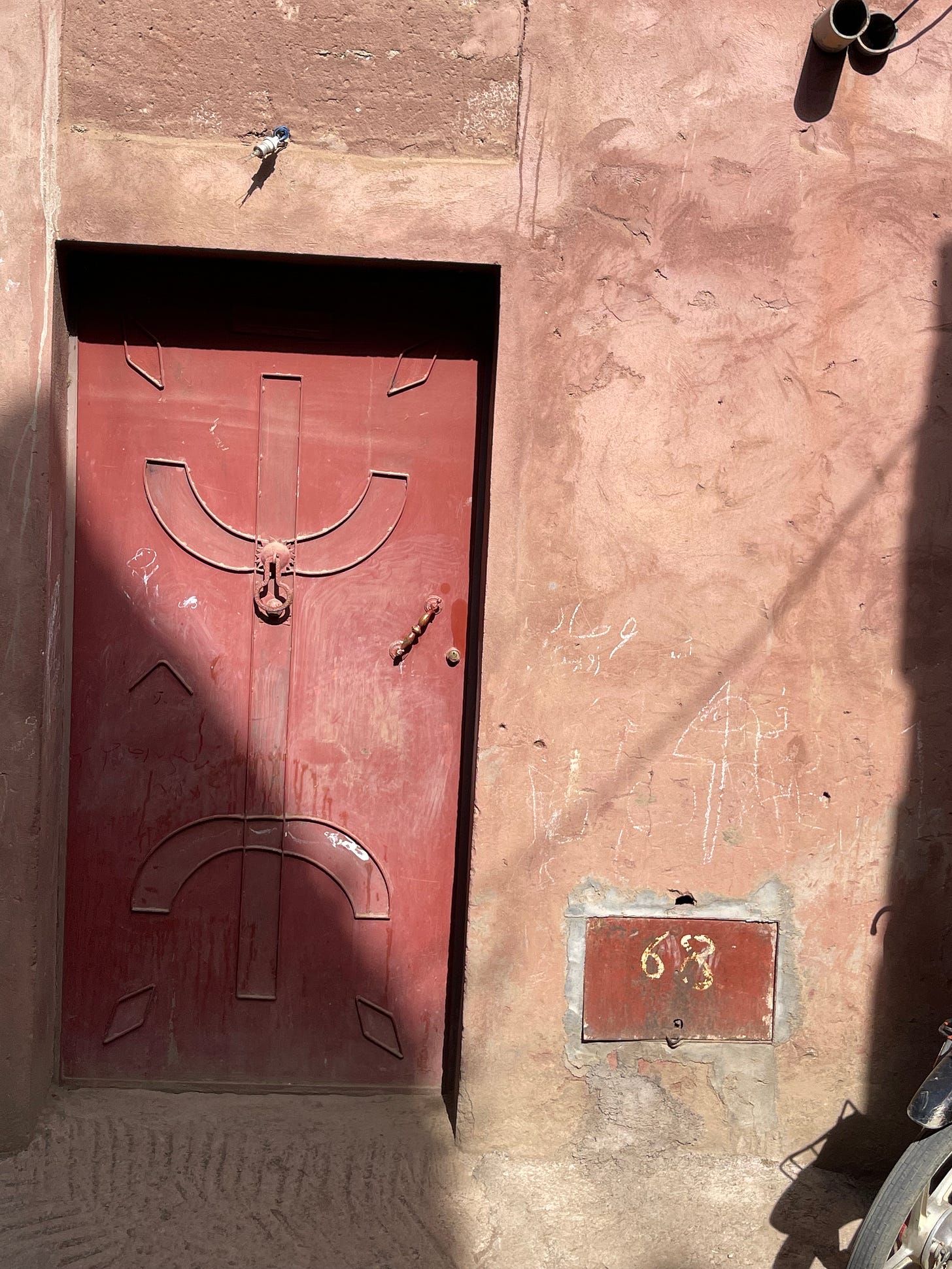Amazigh Not ‘Berber’—Tourism’s Trap, Colonial Echoes
This whole thing is burning and you can’t duck this smoke
Azul felawen,
Hope y’all are having a blessed one. End of the summer means peaches, nectarines, and apricots. It also usually means end of the most magical time for me (#summerbabe), but it’s been hot and I’m pushing into autumn with come through energy - I am ready with my little Fall equinox rituals. I’ve got bokhour with kaff Maryam (كف مريم) in the mix.
But while I’m ready for this shift, settling into life here in Morocco hasn’t exactly been the smoothest.
As a newcomer, I have to tread carefully: criticize and you’re the outsider who doesn’t get it; that is the issue as an expat, if you criticize wherever you are, people get mad. If you praise wherever you are, you’re seen as privileged or naive for thinking that it’s anything but a nightmare.
Rinse and repeat forever.
It’s a balancing act I’m still figuring out.
But there is this one element that is just weird AF to me; just giving Badadook energy:
“Berber” is not the English equivalent of “Amazigh.”
They are not the same. Let me tell y’all - if you say Berber near me, without a hint of awareness or irony, we will fight.
I understand, that quite simply, there are numerous peoples who are identified not by their endonyms (what they call themselves) but by an exonym (what others call them).
The old British, French, and American orientalist lexicon come packed with painful colonial and subservient past, and accordingly needs to go through an overhaul.
People here still continue to refer to the Indigenous peoples and languages of North Africa as “Berber” - locals, expats, and tourists.
If you’re a long time listener, you’ve already heard this part of the podcast but just in case, historically, the term “Berber” has been used to refer to the Indigenous peoples of North Africa. This term/ slur, inherently discriminatory, originated in Archaic Greece as “bar-bar,” an onomatopoeic word mocking languages perceived as unintelligible and their speakers. In Arabic, "barbari" came to mean gibberish or barbaric and was used by Arab conquerors in North Africa before being adopted by European colonizers. #nativesavage
To combat discrimination and to reclaim their identity, the Indigenous peoples use the terms: Amazigh (singular), Imazighen (plural), and Tamazight (feminine) to refer to themselves. Furthermore, the term Tamazgha is also used to refer to the land stretching from the Canary Islands to the Siwa Oasis in Egypt, the lands inhabited by Imazighen. It is wild as fuck, we still continue to subjugate Imazighen by referring to them by the name of their Arab conquerors.
It’s so simple- call Imazighen by the name that they want to be called.
I am perplexed by those who know both terms “Amazigh” and “Berber” and continue to use Berber and even those who use them interchangeably. It seems as though they view both terms as legitimate or one term indexes a more political affiliation with the other term being more neutral. Another plausible reason to account for using Berber is the user’s assumption that the wider audience does not know the term Amazigh.
If that’s the case, super easy fix - bring awareness of the term Amazigh, rather than preserve the slur. Using ‘Berber’ maintains and reinforces ideas of “otherness” and “savagery” which perpetuates the cultural hegemony of Arab and Arabic superiority and Amazigh and Tamazight inferiority. It all matters.
Bringing me to my next pressing issue:
As an Amazigh—I find the way Moroccan culture is marketed in these tourist experiences deeply troubling. These tours, run by Moroccans but specifically tailored and designed for a European audience is deeply, truly, heartbreakingly unsettling. It reveals a troubling internalization of colonial mentalities, where local culture is sanitized, exoticized, and sold back to foreign visitors in a way that feels more like a performance than a genuine encounter. They cater to foreign fantasies rather than respecting the lived realities of my people, reducing us to mere attractions in a human zoo.
This approach strips people of their dignity, turning everyday life into a spectacle to be consumed. It perpetuates a cycle where the primary goal is to please the Western gaze, often at the cost of actual authenticity and respect for the people involved.
The emphasis is on fulfilling tourists' fantasies of an "exotic" Morocco, rather than fostering meaningful, respectful, and reciprocal cultural exchanges. It erases our identity and culture, flattening our complex history into a palatable stereotype designed to satisfy Western expectations. The dynamics of these tours—designed for profit and entertainment—exploit communities, offering a sanitized, commodified version of our lives that aligns with a colonial gaze.
It's a painful reminder of how deeply entrenched colonial legacies are—not just in the eyes of outsiders, but also in how local businesses sometimes perpetuate these narratives to survive economically. It's painful to see my culture packaged and sold like this. These experiences not only distort the true essence of Amazigh culture but also reinforce harmful power dynamics, reducing these communities to curated immersive experiences for outsiders. This dynamic continues to exploit communities for profit, reducing their lives to commodities.
Many Amazigh communities in North Africa, Morocco not excluded, face economic hardship, so these tours often become the only means of survival. For isolated villages in the High Atlas and beyond, offering these curated experiences can be one of the few ways to generate income. That’s the harsh fucking reality.
This creates a painful paradox: while these tours provide much-needed financial support, they do so at a cost. It’s a compromise where local communities must package and sell a version of themselves that fits neatly into Western fantasies, often sidelining their truth.
The economic pressures push these communities to perform their culture in ways that feel exploitative, reducing daily life to marketable experiences. It’s not just about tourism—it’s about survival in a system where the most profitable path often means commodifying one's own heritage. Capitalism is a wild little thing. Just the deep-seated issues that drive communities to participate in these dynamics, and how they are often left with little choice but to engage in a marketplace that values spectacle over substance.
Imagine if similar tours were offered in a place like New York City: where groups of tourists could pay to wander through the apartments of working-class families in Brooklyn or spend a day observing life in underrepresented communities as though they were exhibits in a museum. Crazy as fuck, yet this is precisely the dynamic that plays out in many places around the world, particularly in economically disadvantaged regions.
Why don’t we see tour trips offering a similar experience in NYC?
Imagine under the Airbnb Experience section:
Embark on a Thrilling Expedition into the Hidden Heart of New York City!
Dive deep into the bustling, vibrant jungle of Manhattan, where every corner tells a tale of grit and glory. Step inside a real New Yorker’s tiny apartment—a space that embodies the soul of the city itself. Witness the raw, unfiltered daily life of a true urban dweller as they navigate cramped spaces, towering stacks of takeout menus, and the constant hum of city noise just outside their window.
Feel the pulse of the streets as you weave through a kaleidoscope of cultures, scents, and sounds. Experience the intoxicating aroma of hot dogs, pizza slices, and the occasional waft of mystery steam from underground grates. Join locals in their age-old traditions—whether it's the morning coffee rush, power-walking with purpose, or battling it out with an uninvited rat on the subway stairs.
This isn’t just a tour; it’s a journey into the heart of the concrete wilderness, where every block holds a secret. Discover the quirky, chaotic, and captivating spirit of New York through the eyes of its residents, whose stories unfold like chapters of an urban epic. This is New York as you’ve never seen it—a living, breathing spectacle that dares you to dive in and become part of the legend.
If these tours existed in NYC, they would immediately be seen as exploitative, invasive, and deeply disrespectful—a voyeuristic invasion of people’s everyday lives - slum tourism adjacent. The difference is that in wealthier contexts, there’s an inherent understanding that people are not commodities, and communities are not spectacles for entertainment. Yet this understanding often gets lost when the setting shifts to a place perceived as "exotic" or "other," especially in countries facing economic challenges.
I am not stupid, I understand that the challenge isn’t simply with the tourists; it’s with a broader system that prioritizes profit over people and perpetuates the cycle of exploitation. This is particularly evident in Morocco, where the branding of authenticity is meticulously crafted—a point that fascinates me as an Algerian. Morocco excels at selling a version of itself that feels rooted in history and tradition, with every product, experience, or object tied to a story, ritual, or ingredient that embodies the country’s mystique. My country literally prides itself on how hard it is to enter if you’re a non-Algerian. #cantsitwithusenergytothenthdegree
These contrasts are part of a larger conversation. Globally, this summer has been a reminder of the need for more ethical, sustainable, and respectful forms of tourism that truly benefit local communities without forcing them to compromise their heritage or pander to outsider expectations. Everyone saw the graffiti in Malaga reportedly urging tourists to "go f——— home” and protesters in Barcelona shaming and squirting water at people eating in touristy/crowded/overhyped Las Ramblas.
We’ve been talking a lot in my house recently on what it means to be a good tourist; if there is such a thing, and we landed on this idea of sustainable tourism - like slow tourism, a tourism model that respects, uplifts, and benefits communities without exploitation and not having to check off a list of tourist attractions/ Instagram hotspots or "quality tourism," generally defined as more consideration by visitors toward residents and less drunken behavior, disruptive selfie-taking, and other questionable choices - just be a good human. In all of this who wins?
Anyways, I am rambling like a prison letter so I’ll be leaving you with an image from Palestinian/Jordanian artist Sarah Bahbah’s photo series :
….and a Pan-Amazigh playlist to thank you for your time.
All my love, see you next month with more rambles.
Wided
x
P.S I’m still paying attention - Israeli settlers are seizing Palestinian land under cover of war stealing land to build dreams on catastrophe. Very "if I don't steal it some one else will steal it"energy. I hope both their basket and kneading trough is cursed.
P.P. S Also, NYC declared ‘Zionism’ a protected characteristic in its DEI policies - which means an ethno-nationalist political ideology that supports committing genocide gets the same protection as a person’s race, color, national origin, religious identity, shared ancestry, or ethnicity. The document essentially states that when used critically, “Zionist” functions as a code word for antisemitism, and by extension targets Jewish or Israeli people. Such a dangerous precedent and fucked confluence of ideas. Just do better.
🇵🇸







